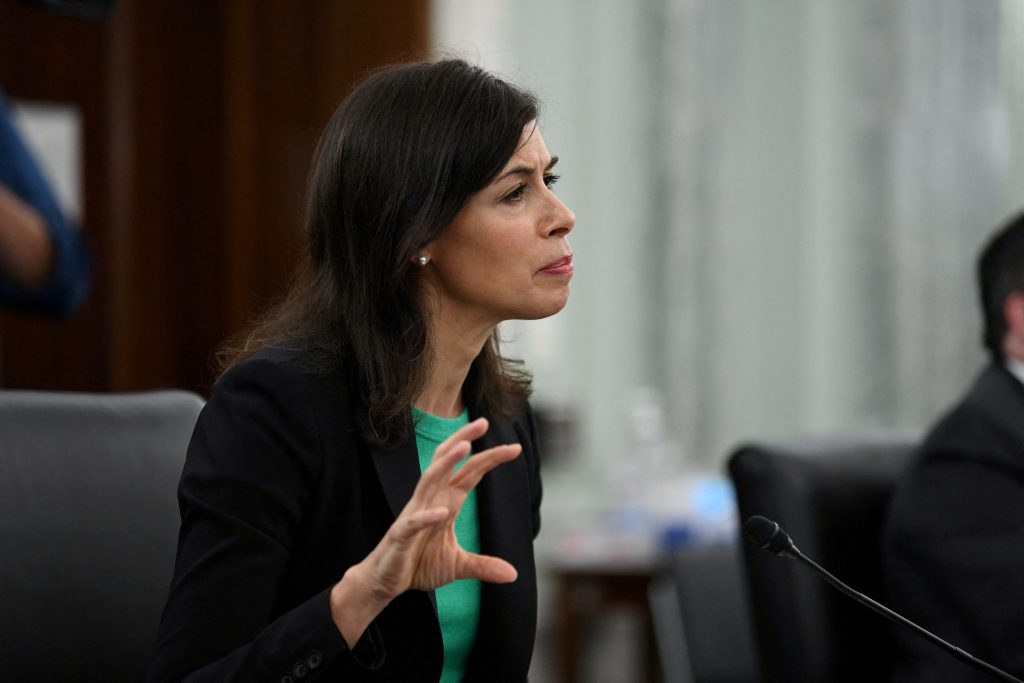
The chairwoman of the Federal Communications Commission (FCC) on Wednesday proposed a potential new rule that would subject automakers that sell internet-connected cars to a telecommunications law on domestic abuse to ensure the protection of survivors.
Cases of technology-enabled stalking involving cars are emerging as automakers add ever more sophisticated features, such as location tracking and remote control of functions like locking doors or honking the horn.
FCC Chairwoman Jessica Rosenworcel last month wrote to nine large automakers and three telecom providers seeking more information about their policies involving internet-connected car technology and domestic abuse. The federal Safe Connections Act gives the FCC authority to help domestic abuse survivors securely access communications, the letter said.
The FCC has required telecom providers under the law on domestic abuse to separate phone lines linked to family plans where the abuser is on the account.
In an interview with Reuters this week, Rosenworcel said issues involving connected cars and domestic abuse “seemed extraordinarily similar” to the work the FCC had already done implementing the Safe Connections Act. Rosenworcel will circulate a “notice of proposed rulemaking” to other FCC commissioners, which will say some types of connectivity arrangements in cars are also covered by the law.
If the full FCC adopts it, a formal public comment period would commence. That could ultimately lead to new rules for the sector.
“It’s really important to remember that we want to make sure survivors of domestic violence are safe, and that their connections are secure,” Rosenworcel said.
The notice will seek comment on what proactive steps car service providers can take to protect survivors from being stalked, harassed or intimidated through their cars, Rosenworcel said. “We are open to creative ideas,” she said.
The Alliance for Automotive Innovation, a car industry group, referred on Wednesday to a previous letter it wrote to Rosenworcel, which said in-vehicle connected services “fall outside the purview” of the Safe Connections Act. “Because the connectivity functionality is associated with the vehicle, rather than a particular person, it cannot be separated among users of the vehicle,” the letter said.
Separately, California state Senator Dave Min on Wednesday announced a bill that would require carmakers to disable an abuser’s access to remove vehicle technology within two business days of a survivor’s request. The carmaker would have to act if the survivor presents a restraining order, or a court ruling awarding sole possession of the vehicle.
Reuters in December reported on a woman who unsuccessfully sued Tesla, alleging the company negligently failed to help her after she repeatedly complained that her husband was stalking and harassing her with the automaker’s technology after she had obtained a restraining order. She would return to the Model X to find the doors open, the suspension settings changed, and the vehicle’s ability to charge turned off. Tesla argued she had no proof that her husband used the car’s technology to stalk her.
When the woman and her husband bought the car, he configured the settings to make himself the administrator on the account and listed her as an additional driver, her lawsuit said. That meant she could not remove his access without his password. When she complained, Tesla told the woman it could not remove him because his name remained on the vehicle’s title as a co-owner, along with hers, according to records she filed in her lawsuit.
Rosenworcel asked auto companies last month if they had processes in place to act on requests from domestic violence survivors to remove access to connected apps from individuals on the title. “Some automakers replied in more detail than others,” she said.
Tesla did not specifically address the issue of domestic abuse in its response, saying customers can grant temporary or permanent access to other drivers and restrict visibility to those people if they wish. The automaker also did not address the question of removing access from people who are on the title.
“Customer data privacy is important to Tesla and embedded in each product, service, and feature by design,” the company wrote.
Meanwhile, Toyota said if a domestic abuse survivor on the title requests that connected services be disabled for another person, the company may ask for verification from law enforcement that the customer was a victim.
“Through these steps, Toyota works to respond promptly to requests from domestic abuse survivors while also focusing on appropriate authentication in order to screen out fraudulent or abusive requests that could further harm the abuse survivor,” the company said in its response.
The chairwoman expects the FCC will likely take up the issue in the next month.
Inside Telecom provides you with an extensive list of content covering all aspects of the tech industry. Keep an eye on our News sections to stay informed and up-to-date with our daily articles.